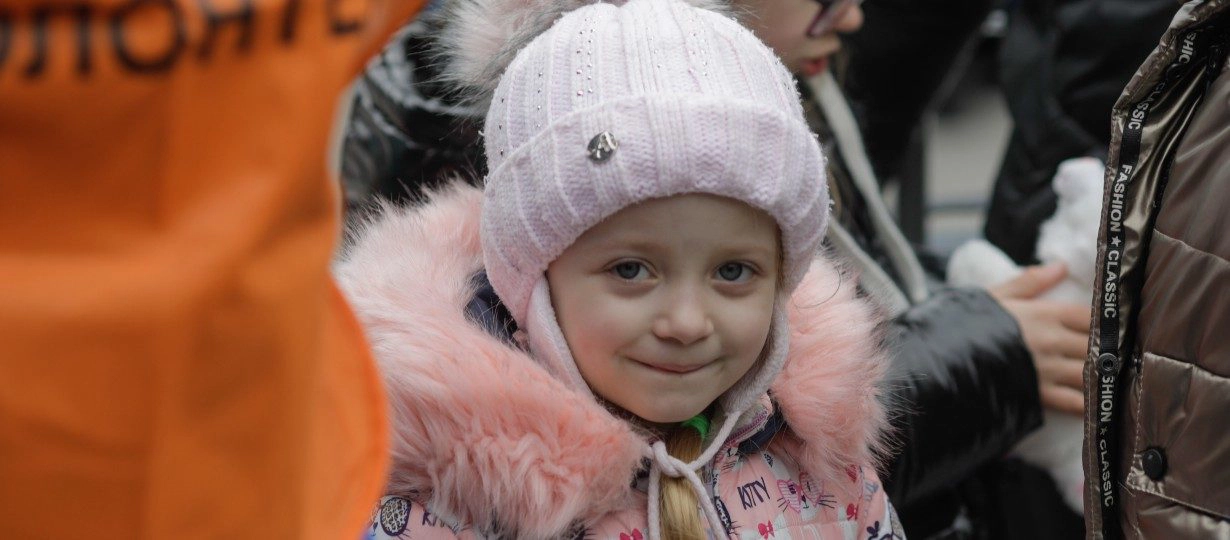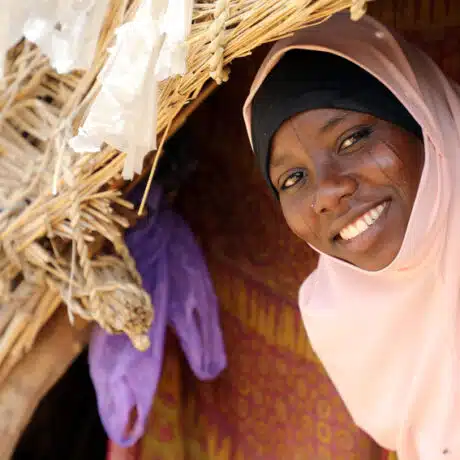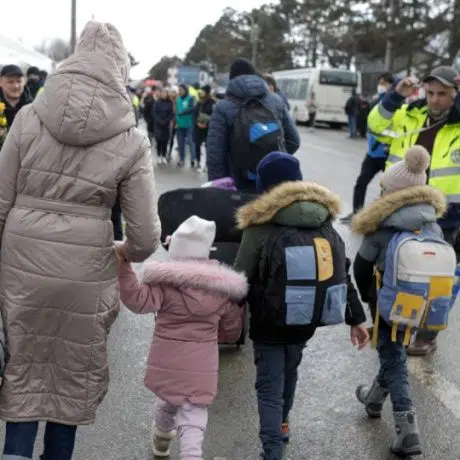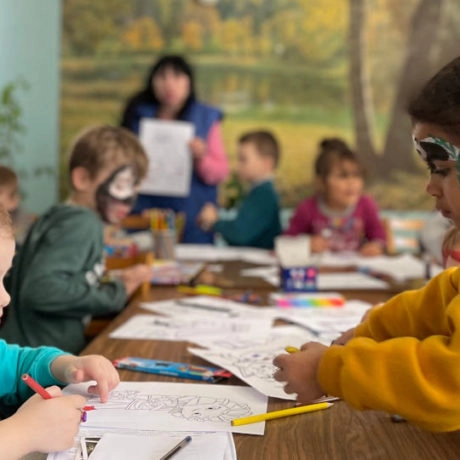News and Stories - Child Protection - 16 March 2022
How to talk to kids about what is happening in Ukraine

For the past two years, kids have been learning to live in unprecedented times throughout the pandemic. Now, faced with news of escalating conflict in Ukraine, they are seeing the world change once again before their eyes. Though not directly impacted here in Australia at this time, the knowledge of what is happening in other parts of the world can induce anxiety, fear and even depression.
In times like these, we all need a little reassurance, and children need to know that their fears and concerns are being heard. Talking to kids about what is happening around the globe will help them better understand the situation and process their feelings, and it can also help you to find small but meaningful ways to make an impact together.
Produced in partnership with child psychologist Karen Young, this helpful guide is designed to equip you with six steps and strategies to help navigate conversations with children during these difficult times.
1. Before you speak, watch and listen and let them show you what they need.
When feelings or worries become too big for words, children might speak through behaviour. All behaviour is communication so rather than talking things out, children might ‘behave’ it out. This might look like a response that seems out of proportion to the situation, or they might seem flatter, or more teary, or quicker to temper. You might see or hear something in their play or conversations that seems unusual, or you might notice that they are eating less or having trouble going to sleep. All of these can signal a need for more context, facts, or comfort. Use what you see to open a conversation, ‘You seem to have something on your mind. Would you like to talk about it?’ or, ‘I notice it’s taking you longer to fall asleep than usual. I wonder if something is worrying you?’
2. For younger children, limit their exposure to the news.
Our own news habits might have changed in recent years as we try to stay in touch with everything happening in the world. As we do this, it might mean children are inadvertently exposed to more. This can happen by hearing our conversations, through news grabs that pop up on the radio in the car, or in advertising breaks on television. When there is increased exposure to the news, children might be more likely to experience the things they hear as being closer, more dangerous for them, or more likely to directly impact them and the people they care about. Young children are less able to put things in context, so it’s best to shield them from things as much as you can. Answer their questions, but only with as much detail as needed to help them feel safe and reassured.
3. For older children, ask them what they know and be guided by this.
With older children, so much of their lives happen when we aren’t there. Ask them what they know and what they’re thinking and open the way for them to say anything they want to. This might sound like, ‘There’s a lot in the news lately about what’s happening in Ukraine. What have you heard? Is there anything you’d like to ask me? You can ask me anything at all, whenever you want to.’ Some children might not want to talk, and that’s okay. Let them know you’re there if they need.
Since COVID, they might be more in the habit of doing their own scrolling through the news. You might not be able to stop this, so talk to them about how not everything they read is from a reliable source. Steer them towards more reliable news providers and encourage them to manage what comes into their feed the way they manage what comes into their bedrooms.
If you sense that they are feeling helpless, angry, or anxious about what they’re hearing or seeing, explore with them what can they do that might make a difference. Helplessness, anger, and anxiety all come from energy with nowhere to go. This will help to redirect that energy. Maybe it’s donating to a charity. Maybe it’s starting closer to home by making their important part of the world feel safer or kinder for siblings, neighbours, or the new kid in class.
4. You won’t always have the answers, and you don’t need to.
If they ask questions that you don’t know the answers to, it’s always okay to say that you don’t know. Depending on the situation, offer to find out and circle back, or explore the possibilities with them by asking them what they think the answer might be. ‘That’s a really good question, and a big one. I think a lot of people would be wondering the same thing. I don’t know what’s going to happen, but I know the world will get through this. We always do. What do you think will happen?’ Or, ‘I don’t know why people do these sort of things. I just know that when it happens the world stands up against it. Why do you think things like this happen?’
There are generally two questions that children are looking to have answered, but they might not ask these directly. The first is, ‘Do you see me?’ What they are asking is, ‘Do you see how big this feels for me?’ Respond to this with validation: ‘This is really unsettling for you isn’t it. I get that. There’s been so much going on and it feels like too much doesn’t it, because it is too much. None of this should be happening and it’s hard to make sense of any of it.’
The second thing they will be asking is, ‘Do you think we’ll be okay?’ This is where they need to feel the strength and safety of you. ‘There are big things happening and I worry about it too sometimes. [It’s okay to share what you feel. It will help them feel validated, but do this with strength by adding in confidence and hope.] But what I know for certain is that we will get through this though. I know this with everything in me. I also know that in the meantime we – the world – will take care of the people hurting as best as we possibly can. I know this is happening now.’ Or, ‘It’s so easy to feel helpless isn’t it. There’s so much happening in the world and it’s hard to know what to do. The thing is, you don’t have to do things on a world scale to make a difference. We all make a difference by starting with our own part of the world. When I feel really helpless and feel stuck in what I can’t do, I look at what I can do. I bring it in closer and get more deliberate about being kinder and more aware of what people are going through around me, and asking what I can do about that.’
5. Let them know they, and the world’s people, are held by many.
Children of all ages might be particularly aware that other children just like them, are suffering in unfathomable ways. Let them feel the strength and safety of being part of something bigger – our common humanity. Whenever there is trauma in the world, there are also remarkable demonstrations of solidarity and kindness, and love and support for strangers by strangers. Let them hear these stories. Tell them about the strangers who are opening their homes so people who have to leave theirs can have somewhere safe to stay. Show them how countries are coming together to help with humanitarian aid such as food, medical help, ways to get people to safety. Talk to them about how world leaders are working together to help the world feel safe again.
Try, ‘Whenever there is bad in the world, there will always be more good. Things like this bring people and countries together. They work out what needs to happen to look after the people, and to make sure something like this never happens again. They learn about how it happened, and why, and then they use that information to make the world safer for everyone. We all have a part to play in that, by asking what we can do to help the world feel kinder and safer for everyone around us.’
6. Let them know that whatever they are feeling is okay.
Let them know that when big things happen, we can feel all kinds of things that don’t make sense. Whatever they are feeling, whether it’s something big or nothing at all, there are no wrong ways to feel. Research has found that children are more likely to struggle with traumatic events if they believe their response isn’t normal. This is because they tend to be more likely to interpret their response as a sign of breakage. Big worries and big feelings won’t hurt children – it’s feeling alone in those worries and feelings, or deficient because of them that hurts.
Whatever they’re feeling, let them feel in you that you get it. Try, ‘I can see you’re feeling scared. That’s completely understandable. It’s a frightening thing to happen.’ Sometimes it might involve just being with them while they talk, feeling what they feel, and being a strong steady presence while they think and feel around the issue for themselves.
And don’t forget about you.
You are the guardians of their safe space in the world. When their world has spikes, ultimately, you are the one that can help their world feel softer and safer again. When times feel uncertain or your own anxiety feels big, come home to the things that make sense. Come home to each other, to stillness, to play, to rest, and conversation. Come home to listening more openly and caring more deeply, to nature, and warm baths, and being more deliberate, to fighting for what we can control, and the soft surrender to what we can’t. Come home to the safety of your tribe. Come home to that part of you that is timeless, and strong, and still, and wise, and which knows that, like everything that has ever felt bigger than all of us for a while, you will get them through this. This will make sure that whatever is happening around them, there will always be a safe space for your children to come into.
Find out more about our work in Ukraine and how you can support it.





